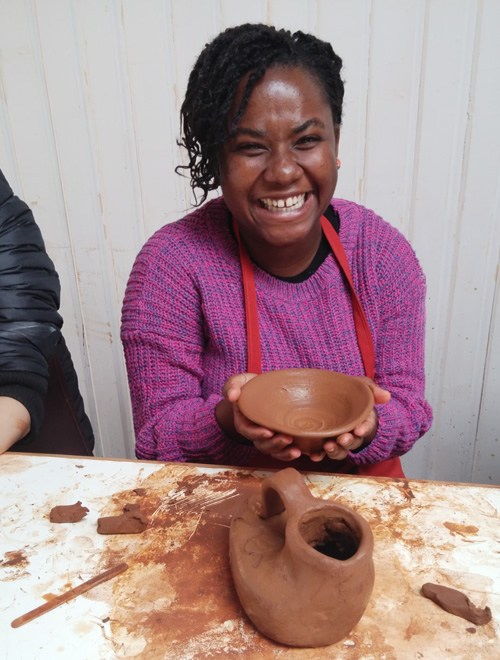How To Select the Right Study Abroad Courses
A Semester of Study Abroad in Santiago, Chile
Article and photos by Stephane Alexandre

|
|
A square in Santiago, Chile.
|
I stepped on the plane to Atlanta, exhausted, sleepy, and angry. I could not believe there was a delay in my flight for five hours. Nonetheless, I was determined to make it to Santiago, Chile, for the beginning of the semester. After all, managing to study abroad took a colossal amount of courage for my senior year. Having lived in Haiti for my first ten years, I knew that moving from Mirebalais to Boston was the greatest culture shock. What lay before me was six months in a new country, speaking a new language, and living with a new family. As an International Relations major, I was confident that the Tufts in Chile program would improve my Spanish-speaking skills and help me grow in a new environment. Soon, I was fitting my whole life in two suitcases and waving Adiós to Tufts University and Hola to Pontificia Universidad Católica de Chile!
The cold, crisp air slapped us awake as we exited the plane after the 18-hour journey. Thankfully, our program director was eagerly waiting with a big smile on the other side of the door. For the next three weeks, I took a crash course learning about Chile's culture, history, politics, and economy. We listened to lectures on voting rights, mining in Northern Chile, agriculture and labor unions, and the socioeconomic gap. The hardest part of the transition was over visa applications, turbulent flights, layovers, and saying goodbye to family and friends. The next logical step was simple: choosing the suitable classes.
Tips for the Course Pre-Selection Period
-
Remember your training. You have previously registered for courses at your home school. All you need to do now is adapt to the process in a slightly different system. Read the class descriptions and previous syllabi to decide which courses interest you. Translate the syllabi and take notes on the courses you need to fulfill requirements.
-
Research. Research. Research. First, research the courses that will fulfill your requirements and compare objectives and course goals. It is essential to know how many classes you can add/drop in a semester and if there are different regulations for exchange/international students. University websites worldwide are a great way to learn more about the physical campus and get a general feel for the student body and campus environment. Visiting the campus in the country where you will be studying before courses begin will ease some of the angst on the first day of classes.
-
Communication. Email your home university's principal advisor(s) to pre-select the courses that fulfill your major/distribution requirements. Keep the flow of communication constant, as you might need to send syllabi and course objectives documents for transfer credit purposes.
|
When selecting your classes, you must constantly communicate with your advisor(s) back in the U.S. to choose those that will fulfill your requirements. There are typically two types of requirements: distribution and major requirements. For most, fulfilling the requirements necessary to graduate on time is paramount.
-
Which courses will best fulfill your requirements?
-
Are there specific instructions/rules for international students?
-
How many courses can you add/drop?
Tips for the Course Selection Period
-
Teamwork. In my new university, students register for courses on the first day of class. Oh, the chaos that ensued, especially when I realized that the next class started in less than an hour in another classroom — on another campus — across the city. To decrease first-day angst, sign up with your friends. Your friends are adjusting, adapting, and learning as you are, and they are your best support network. Having a map of the campus is critical, and working together helps make the first day less overwhelming.
-
Ask for help when needed. Ask for help when needed. While friends are helpful, their knowledge is sometimes limited. It helps to know when to call in the professionals. Professors, TAs, and school administrators are there to help on the first day. If you are overwhelmed, ask for help to find the locations and where to sign up for each course. Remember that many students are going through the same process, and you are never alone in the experience.
-
Pick ONE risky class. There are always limited spots for courses. Popular courses fill up quickly, so it helps to register early. When picking classes abroad, sometimes it helps to step out of your comfort zone. Pick a class that seems risky and piques your interest. Choosing a film class abroad was an excellent idea for me. I knew that back at Tufts, I would have needed help finding a course on Santiago's cinematography. The course required me to walk around the city, learn street names, visit museums, and see historical artifacts. You may only study abroad as an undergrad once, so try to make the most of it!
|
Tips for the Course Post-Selection Period
-
Attend class. Attending is often optional, but you risk losing more than tuition money by not attending. In Santiago, all classes include group projects as part of the cultural tendency for sharing perspectives and communal learning. Having loved working independently in the past, I learned just how much I was missing by working on assignments alone. During my first few weeks of working in groups, I made more grammatical mistakes than I care to recall. But that was the best way to meet Chilean students: laughing over my mistakes.
-
Adapt to a new system. From academic calendars and grading policies to workload and group projects, adjusting to a new system takes time. Be patient with yourself; there is no standard way to adapt to a different life. Professors understand that exchange students might need more help initially and are ready to assist.
-
Schedule free/off time. Taking time off on the weekends to recharge and experience a change of scenery is an excellent way to return focused every week. There is so much to learn outside of the four walls of a classroom. Scheduling time outside class is also a great way to immerse yourself in the culture and learn from local students. Students usually love interacting with people visiting their country and the new perspectives offered.
|

|
The author in a pottery class Pomaire, Chile one weekend.
Photo by Stephane Alexandre.
|
Cultural Adaptation as a Student in Chile
I wish I had been more prepared for many aspects of Chilean culture. I was not ready for the meltdown I would experience on the first day of classes, fearing that I would not be able to graduate on time. I had the resources available but could have used them more effectively. I could have contacted my program director more often and relied on my professors to help with coursework. However, for far too long, I was afraid that I would appear too needy. I constantly felt I represented more than myself, as though I must disprove every misguided notion about America. Looking back, I realized that I could only represent myself. Eventually, I did reach out to professors when I needed help, and I appreciated how informative and helpful they would have been had I done so earlier.

|
|
Driving up the Cordillera hills to go skiing in the Andes.
Photo by Stephane Alexandre.
|
One aspect of Santiago's culture that I wish I had anticipated is the machismo. Aggressive masculine pride became apparent within a few weeks. I felt uncomfortable walking down the street while being verbally harassed. I immediately reached out to my director, who helped me understand machismo's history in Chilean culture. In my six months in Chile, I became accustomed to the food, the music, the chilenismo, and even being pushed into trains. Yet, I refused to give in to the machismo. Over time, I learned to deal with the need of some men to prove their masculinity in my own way and soon felt more comfortable. I had a right to walk, run, get on trains, and breathe. I know that I cannot change a culture in six months — and that was never my goal. However, without intending to, I am becoming a better leader by learning to ignore the part of a culture that makes me uncomfortable.
My advice when studying abroad is not to be afraid to make mistakes. As it is frequently stated, by making mistakes, you learn. Being in a new country, speaking a new language, interacting with new people, and adapting to a new culture are different aspects of your life abroad. Your stay in a new land is not the right time to get everything right; you should expect to make mistakes, laugh, and grow. I have visited many countries, but my six months in Chile will always hold a special place in my heart because I learned to grow. Adapting to a new culture as your own is both enthralling and terrifying, like jumping out of a plane. It's chaotic, scary, and exciting simultaneously.
Perhaps I had just enough in me to go abroad my senior year. Enough courage to try street food, get sick, and eat it again. Enough patience to make horrible grammatical mistakes my first month abroad and still allow myself some slack. Enough self-control to run between two campuses to sign up for courses. Most importantly, maybe I was just crazy enough to do it all over again. Being a first-generation college student in my family, I know I traveled more than others to get to Santiago. The most important aspect of travel I have learned is that I will always have a million excuses for not getting on a plane. Still, I will always have just enough courage to do it anyway.
|
Stephane Alexandre is in her senior year at Tufts University (Class of 2017). She expects to graduate in spring with degrees in International Relations and Community Health. She was born in Mirebalais, Haiti, and eventually moved to Boston. She studied abroad in Santiago, Chile. Stephane writes, "If we were meant to stay in one place, we would have roots, not feet!"
|
|
